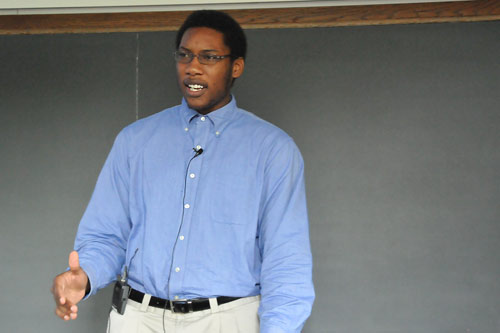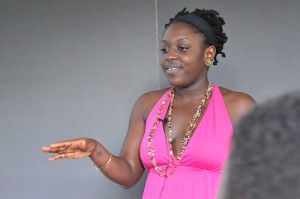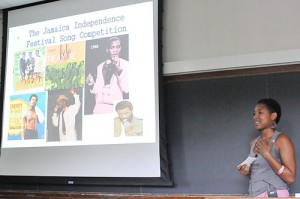Mellon Fellows Study Imprisoned Fathers, Haitian Diaspora, Jamaica’s Post-Independence Identity

According to the Bureau of Justice Statistics, one out of every three black men between the ages 20 and 29 is in prison, on probation or on parole. Of these men, 94 percent are fathers.
English and African American Studies major CaVar Reid ’11 is curious to discover how prison affects a man’s ability to be a father.
“I want to ask them, ‘What were your expectations about your relationships with your children when you were incarcerated? How do you think your incarceration has affected your children? How did you stay involved with your children?'” Reid says.
As a 2009-11 Mellon Mays Undergraduate Fellow, Reid will have the opportunity to interview incarcerated and former prisoners at the Osborne Association for an independent research project titled “Ain’t No Fathers in the Hood: An Ethnography of Incarcerated Black Fatherhood.” His study will include the interviews, and cite historians, social workers and anthropologists on prison fatherhood.
“With my data I am trying to tell the story of a group of black men who, I would suggest, are ignored because they are black and incarcerated and therefore believed to be uneccesary to society. But I am also critiquing their alleged inability or non-desire to have a positive impact on their families by showing how incarceration tries to make these apathetic to the outside world and unable to connect with it,” Reid says. “Ultimately, I am trying to critique popular descriptions of blacks fathers as ‘purposefully missing’ by showing how criminal justice policies work to make many of them disappear from their communities and then blames them for not ‘being there.’ Then I want to show how some of these fathers are still trying to ‘be there’ for their families even though they are incarcerated.”
Reid and four other Wesleyan Mellon Mays fellows presented their research topics on July 30 in Fisk Hall. Four Mellon Fellows from Queens College also presented their projects.
The Mellon Mays Undergraduate Fellowship program aims to increase the number of minority students, and others with a demonstrated commitment to eradicating racial disparities, who will pursue Ph.D.s and go on to teach in U.S. colleges and universities.

Sociology and African American Studies major Marsha Jean-Charles ’11 described her project on identity formation among members of the Haitian Diaspora.
Jean-Charles, herself of Haitian extraction, will create surveys and questionnaires, undertake observations and interview friends and family with Haitian backgrounds. She’ll focus her studies in the country’s three largest Haitian communities — New York, Boston and Miami.
“I have friends who don’t have a positive Haitian identities, and I hope to analyze why people choose to identify the way they do,” Jean-Charles explains.
Science in Society major Taylor Cain ’11 analyzed the artwork on several WWII-era public health posters for her project, “The First Video Vixens and Poster Prostitutes: American Women in the Anti-Venereal Disease Campaign of World War II.” She argued that the representations of women in the federally sponsored campaign portrayed the female body as a deceivingly alluring site of disease.
One poster, depicting a provocatively made-up woman, reads: “She may be a bag of trouble—syphilis and gonorrhea.”
“Her face is dark red and that’s suggestive of Communism spreading like the disease is spreading through the female’s body.” Cain says. “It’s saying that the war is a danger to soldiers and so is the female body.”

Dance and Feminist, Gender and Sexuality Studies major Indee Mitchell ’10 will research historical stereotypes of black women in dance, in a project titled “Finding Room to Wiggle.” Latin American Studies and Music major Carolyn Sinclair-McCalla ’10, will research “The Role of the Jamaica Independence Festival Song Competition in the Formation of Jamaica’s Post-Independence Identity.”
Krishna Winston, coordinator of the Mellon Mays Undergraduate Fellowship, Dean of the Arts and Humanities, and the Marcus L. Taft Professor of German Language and Literature commented that this summer’s Mellon Mays Program was the largest it has ever been, with five Wesleyan fellows, five Queens College fellows, and five fellows from the University of the Western Cape in South Africa. (To view a video clip of a Western Cape student’s presentation click here. Quicktime is required.)
“The South African Fellows gave up three weeks of their winter vacation and a week of classes to join us, and it was a joy to see how well they bonded, socially and intellectually, with the American Mellon fellows,” she says. “What they contributed to our program and gained from it confirmed the Mellon Foundation’s wisdom in expanding the Undergraduate Fellowship to South Africa.”
In 1988, the Andrew W. Mellon Foundation launched a program designed to increase the number of African-American, Latino/a, and American Indian faculty members at U.S. colleges and universities by providing academically promising students from these groups with mentoring, opportunities for conducting independent research, skills development, and initiation into the academic life. Wesleyan’s Mellon Program has been in existence since 1989 and has produced 9 Ph.Ds. thus far.
Ten Wesleyan fellows are at various stages in graduate school. Nationally over 250 Mellon fellows have earned the Ph.D. and well over 500 are in the pipeline.

